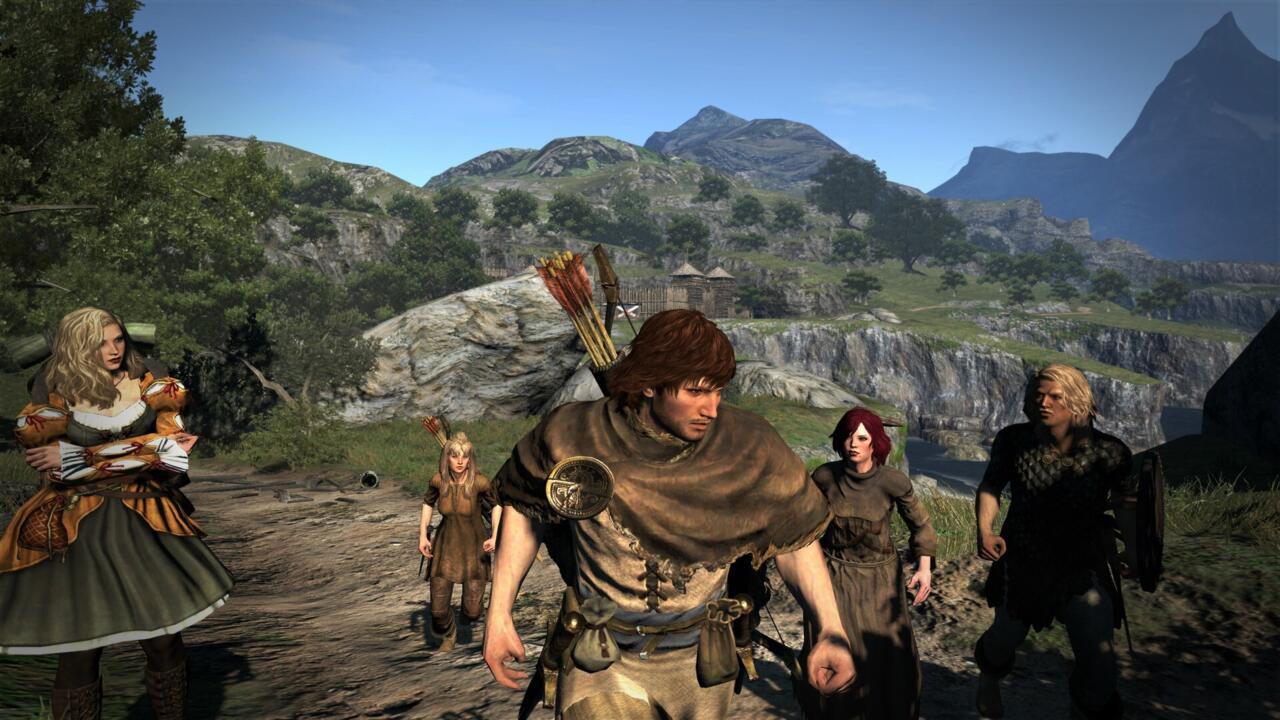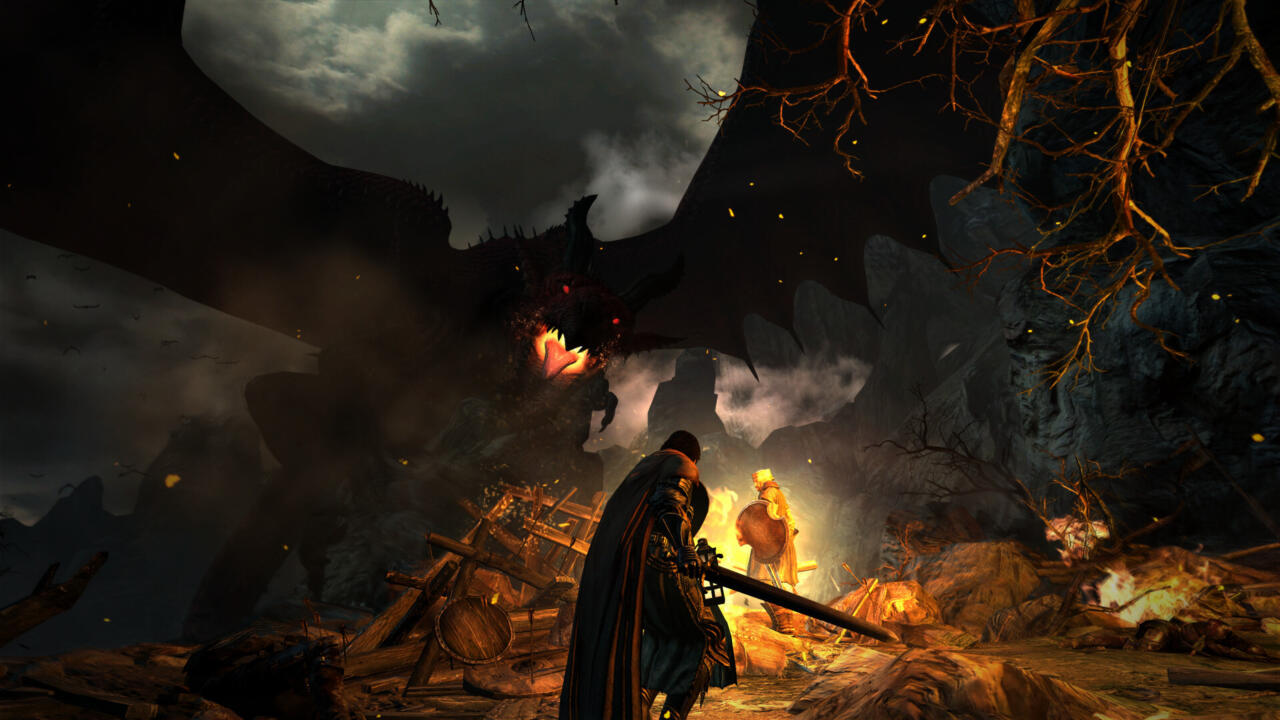Why Dragon's Dogma 2 Is Worth Getting Excited About
Capcom's idiosyncratic RPG is finally getting a sequel, and there are a ton of reasons to get excited (and revisit the original!).
It's been a long 10-year wait for Dragon's Dogma fans. Capcom's idiosyncratic open-world RPG hit Xbox 360 and PS3 in the spring of 2012, and would eventually get a re-release-meets-expansion in the form of Dragon's Dogma: Dark Arisen. Ten years later, we're finally getting a sequel, as Dragon's Dogma 2 was recently announced. Dragon's Dogma devotees are over the moon, but it might not be as apparent to gamers who didn't discover the game why exactly we're all freaking out.
What the heck is a Dragon's Dogma?
In the 10 years since Dragon's Dogma, there have not been many games that look or play like it. Dragon's Dogma dropped players into a peaceful seaside fishing town and got them used to the slow pace just long enough for a dragon to show up and steal the silent protagonist's heart. Literally, your character has no heart in their chest after the encounter, making them the chosen one known as the Arisen, and giving them a personal impetus to seek out and defeat the dragon.
That sends you on a long, continent-spanning journey that involves kings and queens, legacy heroes, conspiracies, death cults, and more. Along the way, you discover one of Dragon's Dogma's unique features, the Pawn system. Dragon's Dogma was released about six months after Dark Souls, and the two have a few important things in common: They're both single-player, Western-inspired fantasy RPGs with demanding combat, and they both have unusual online systems that let you engage with other players without actually playing with them.
The Pawn system

Every Dragon's Dogma player builds a Pawn to accompany them on their journey. These pawns are just like the player character in that they can take on any available player class, level up, and equip gear. However, in the context of the story, Pawns come from a place called The Rift and have no will of their own. They're more like automatons or constructs. They fight faithfully alongside you and learn from their surroundings as you play with them. When you discover a new monster weakness, they'll call that out in future battles, or make observations about what monsters might be nearby as you explore. You can also set their preferences manually to help get them acting just how you like. This dress-up combat buddy is then uploaded to Capcom's servers, and other players can rent and rate them. Head to a Riftstone and you'll be presented with a semi-random smattering of 100 pawns to choose from. So if your pawn is currently learning the ins and outs of melee combat, you could rent a healer to fill in the gap. In essence, other players are helping you build out a complete party. If you have friends playing, you'll see their pawns in the Rift, too, and can rent them for yourself.
This could be seen as a stand-in for traditional co-op, but by the end of the game, it feels quite different, as the Pawn factors into the story in addition to being a character that you molded with your decisions. They're one of the voices you'll hear the most throughout the game.
With 10 years of games between then and now, there's a ton of potential for pawns to be more interesting than ever in Dragon's Dogma 2. Artificial intelligence and deep learning have both taken huge strides and could help shape how they behave and learn. Cross-play has also become much more normal in recent years, and the idea of being able to rent any of my friends' pawns from any platform is exciting.
Tough combat

We compared Dragon's Dogma to Dark Souls earlier in terms of their online systems, but although both have tough combat, they're really nothing alike. In Dragon's Dogma, you'll find yourself climbing magical beasts like Cyclops and Gryphons, grabbing onto their fur and strategically hacking at vital weak points to defeat them, while your pawn assists with a bow and arrow, healing spells, or whatever other class skills you've set them up with. This sounds a bit like Shadow of the Colossus at first blush, but where Team Ico's game is more of a puzzle that happens to take place atop a monster, this is a true action-RPG; the game's team used titles like Street Fighter II as inspiration for the pace and speed of combat, while art director Daigo Ikeno was the first one to say that everyone keeps making games about giant creatures, but "all you end up doing is slashing at its feet," and was the first to suggest climbing.
It feels something like a more approachable, organic version of Monster Hunter. It's not quite so loot- or mission-driven, but you're approaching each monster in a different way. A Cyclops' biggest weakness is its eye, while a Chimera has a spell-casting snakehead for a tail, and lopping that thing off makes the rest of the fight a lot easier. And that doesn't account for the variety of classes that you can assign to yourself and your pawn that can completely change the landscape of a combat sequence.
Ten years later, I can't remember playing anything quite like Dragon's Dogma when it comes to combat. Pieces are visible here and there, but not all in one place.
Open up the open world

Dragon's Dogma is a rarity in the Capcom library: a big, open-world game. It featured many of the tropes of the open world, like random events, NPC quests, and dungeons to explore, but it also didn't dump a map covered in icons on you. It provided a sense of mystery, something like the feeling of exploring Elden Ring's Lands Between for the first time (though with much more straightforward lore). Capcom is known for more tightly focused games like Resident Evil, and the closest we usually get to an open-world experience is Monster Hunter. Even the expansive Monster Hunter World is broken up into discrete areas, though. A return to Dragon's Dogma signals a return to an open world. If the team can focus on creating the same sort of mysterious, dangerous world for a new story, that alone will make Dragon's Dogma 2 stand out from the rest of Capcom's library.
So much room for activities
While Dragon's Dogma doesn't load you down with map icons, that doesn't mean there isn't a ton to do. There are all manner of NPC side quests that you can find (or miss) that have different paths depending on your approach and decisions. The class system gives you nine different ways to approach the game, and it's up to you how many you want to explore. You can focus on just enjoying your cool greatsword if you want, but you can also become a powerful spellcaster, an archer, or you can even begin to mix these.
Once you roll credits on the initial game, something called the Everfall opens. This bottomless pit is Dragon's Dogma's endgame content, and you can fall almost endlessly, fighting new and souped-up versions of previous monsters and bosses, finding new loot, and coming up with new strategies. This ended up being a great way to let players enjoy as much content as they wanted in Dragon's Dogma; if you just want to beat the game, you can, but if you want to keep playing and see a special "true" ending, there's a lot more optional stuff to do.
Capconfident

It's worth noting, too, that Capcom has been on something of a hot streak the last few years. Especially since the release of Monster Hunter World and Resident Evil 7, the company has consistently released games that are received warmly by fans and critics alike, including not only original games like the two above, but even remakes, a notoriously thorny subject with gamers, have hit most of the right notes. The Capcom that we have right now, with its current swagger and confidence, is the one I want releasing a sequel to my favorite Capcom game.
What's next?
It's hard to guess what could be in a Dragon's Dogma sequel considering that we've only seen a logo at this point. One hope among fans of the original is the addition of genuine cooperative play. This would be a big departure from the Pawn system, but fans have been clamoring for a co-op play option on places like Reddit since the game was released, and Capcom's Japan-only MMO Dragon's Dogma Online, which fans have resurrected with private servers as recently as this spring, shows the exploration of the idea within Capcom. In other words, there's absolutely interest in a proper multiplayer option for these games. On top of that, though, we have a decade of improvements to artificial intelligence that could overhaul the Pawn system, new ways to interact with monsters, and more.
What we really want, at its most basic, is more Dragon's Dogma. There's just the one game and its expansion, and we've been waiting ten years since then. Director Hideaki Itsuno, who guided the original, is working on this sequel, and we're happy just to get more.
Got a news tip or want to contact us directly? Email news@gamespot.com
Join the conversation